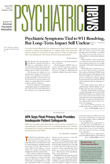“Well, I think this has been tough for everybody. The effort that we have put into doing some good and trying to help people out since 9/11 is still ongoing. IT’S STILL OVERWHELMING, ACTUALLY.”—Katz
“OUR GROUP DID FOLLOW UP SOME OF THE PEOPLE WE HELPED IN THE FALL. We followed up a few hundred of them by phone, checking on how they were doing. And we got mixed results. Some people were doing OK; a large portion were not. We were certain that a large portion of them were not only not doing OK, but were also not getting adequate assistance. They were having a hard time coping with both how they were feeling and with the system that they have to navigate to get help of any sort—emotional, financial, job related, and so forth.” —Craig Katz, M.D., president of Disaster Psychiatry Outreach, a nonprofit group based in New York City that provides psychiatric assistance to people affected by disasters
“MY COLLEAGUES AND I CONTINUE TO BE BUSIER THAN WE WERE BEFORE because of all the World Trade Center–related care that we are offering. In other words, we are doing that on top of other things that we’ve been doing. Except for the increased work, though, most of us are doing pretty well. Which isn’t to say that we’re not going to have a lot of feelings as the 9/11 anniversary comes along.”
—Spencer Eth, M.D., medical director of behavioral health services at St. Vincent’s Hospital in New York City
“I WAS WORKING AT THE PENTAGON’s FAMILY SUPPORT CENTER [WHICH WAS ESTABLISHED IN RESPONSE TO THE SEPTEMBER 11 ATTACK]. It was in place for a couple of months, then disbanded. Some of the families had been from out of town, so I don’t know how those people I helped are doing.
“On the other hand, some of my regular patients have had some troubles. These are kids who were already depressed or worried about things to begin with. When they found out about the Pentagon attack, they got really concerned that it was going to happen again, that they might lose their parents.”
—Lt. Cmdr. Lisa McCurry, a child and adolescent psychiatrist and an assistant professor of psychiatry at the Uniformed Services University of the Health Sciences in Bethesda, Md.
“RIGHT AFTER THE PENTAGON TERRORIST ATTACK, WE HAD A NUMBER OF SESSIONS FOR MEDICAL STUDENTS. The students thought the sessions were valuable. But then their interest, their patience, and their focus quickly shifted to other things, although there continued to be feelings. . .that we really didn’t do much to take care of our medical students at the time. . . .
“What we should be doing is to make more of a community in an ongoing way so that if another event were to happen, we would be more in touch with medical students. But it’s hard to get going.
“[In contrast] I went to a meeting of the Association of Directors of Medical Student Education in Psychiatry in June. Someone talked about the need for medical schools to have disaster plans—for students and for the school. We have hospital disaster plans, but we don’t have school-based disaster plans. Still, there is a movement afoot to create those, and somebody at Johns Hopkins is actually doing that. . . .
“[Also, our psychiatry] department has become interested in trying to understand more about the role of psychiatry in terrorism and disasters, and I have been the point person. So I have come to understand more about the role of psychiatry in disasters, but I still haven’t figured out what the role of an academic department ought to be. We were just talking about that today, my chairman and I.”
—Julia Frank, M.D., director of medical student clerkship in psychiatry at George Washington University Medical Center in Washington, D.C.
